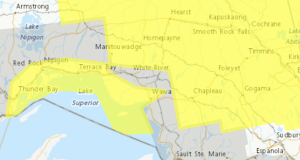 For several years, Ontarians have been experiencing turmoil and pain on several fronts: access to affordable housing, access to health care, shortage of physicians, inflation and cost of living, impossibly low social assistance support, and timely access to programming for children with Autism, to name but a few of the burdensome issues. Most of the way through his second term, Doug Ford sees an election looming on the horizon. Ontarians don’t hesitate to say his government has done little to alleviate pain since the Conservatives took office, and few see much hope in sight.
For several years, Ontarians have been experiencing turmoil and pain on several fronts: access to affordable housing, access to health care, shortage of physicians, inflation and cost of living, impossibly low social assistance support, and timely access to programming for children with Autism, to name but a few of the burdensome issues. Most of the way through his second term, Doug Ford sees an election looming on the horizon. Ontarians don’t hesitate to say his government has done little to alleviate pain since the Conservatives took office, and few see much hope in sight.
It was with the above situation in mind that, in my column two weeks ago, I called on the Premier to get his priorities straight. He can say all he wants that he is there for the little guy, but that doesn’t make it true. The truth is that Doug Ford and his Conservative government desperately need a reality check to find out what really is important to the people of Ontario instead of the whispers of behind-the-scenes influencers and lobbyists.
But this week, there is one matter of the highest priority for the people of Algoma-Manitoulin and all of Northern Ontario that the Ford government either doesn’t see, doesn’t understand or, worse, doesn’t care about. Recently, Algoma Public Health (APH) and Public Health Sudbury and Districts (PHSD) have been doubling to raise awareness of a horrific tragedy before our eyes. It is common knowledge that the Opioid Crisis is a problem across all of Ontario and, in fact, across Canada. The situation in Northern Ontario is decidedly worse than that of Southern Ontario: the data and a report from APH support this statement. Just days ago, Dr. John Tuinema, APH’s acting medical officer of health and CEO of the Algoma Board of Health, reported the dire nature of the situation in this district, demonstrating that the rate of opioid-related deaths is three times higher than in the rest of Ontario.
Let that sink in a moment.
We are not talking about the rate of opioid use or the prorated number of EMT calls for assistance. We are talking about actual deaths. The October 24, 2024, edition of the Sudbury Star reported that in the city of Sault Ste. Marie and area, “the city jumped to the top of the province’s list for the rate of opioid-related deaths reported during the first three months of 2024,” a significant rise from the previous three months. The November 5th issue updated this, pointing out that “Sault Ste. Marie’s rate of 64.2 deaths per 100,000 people (annualized) in both Q1 and Q2 this year translates to 24 deaths, the data shows. Blind River and Garden River also experienced one death each during Q1 and Q2.”
Bear in mind that the deceased are not faceless people or cold statistics. To us, these figures represent our friends, neighbours, co-workers, classmates, and family members.
This news is even more troubling because the information is not new to anyone. Let there be no misunderstanding; the government has been told about this time and time again. I know for sure that I have raised this issue on multiple occasions in the Legislature. Sault Mayor Matthew Shoemaker summed it up nicely, saying, “It’s frustrating, disappointing and makes you angry. Without something changing, we know that the stats are going to continue looking like that.”
By way of an example, back on November 18, 2021, I asked Premier Ford to stop ignoring the opioid crisis in Northern Ontario and declare a public health emergency. I informed him that the previous week, seven white crosses had been erected in M’Chigeeng First Nation, each one representing a community member whose death was confirmed to be opioid-related. The transcript from Hansard states, “Enough is enough. We need to act now and prevent more injury and death. Community advocates have been clear on what they need, but this government has not done what is necessary. Will the Premier and this government recognize the severity of the opioid epidemic and declare a public health emergency in the province?”
I have repeatedly pleaded that people in Algoma-Manitoulin are dying because the government is not taking action on opioid addiction and mental health. Backing this fact up, the November 5th, 2024 edition of The Sudbury Star reported that more than 260 Crosses for Change are on display at the corner of Brady and Paris Streets. Each cross represents a loved one lost to overdose.
Instead of taking meaningful action, the government responds with typical lip service and answers in coded ‘politispeak.’
Shortly before rising for the summer recess, on May 28, 2024, I again appealed directly to Premier Ford during Question Period, asking the government to take meaningful steps to address the opioid crisis in Algoma-Manitoulin and Northern Ontario: “My question is to the Premier. Last week, the Premier announced that the government will be spending $225 million to introduce and expedite alcohol sales into convenience stores and gas stations. Meanwhile, in northern Ontario, we continue to see opioid-related deaths rise. In fact, the North has three times the mortality rate from overdose compared with the rest of the province.
“The priorities in Timmins, Sudbury, Thunder Bay, Sault Ste. Marie, North Bay, Sioux Lookout, Elliot Lake and every community across northern Ontario is not a quicker access to alcohol. They would rather see these millions go towards supervised consumption sites and addiction centres that have been working on shoestring budgets to save people’s lives in northern Ontario.
“Why is the Premier prioritizing alcohol sales over dying people from opioid overdoses?”
Instead of answering my question, the Premier called upon Michael Tibollo, Associate Minister of Mental Health and Addictions, to respond. Instead of saying what the Ministry would do to address the crisis hitting the North so hard or even promising to look further into the matter, Minister Tibollo responded in the broadest of terms, explaining that the Province has made ‘significant investments.’ He stated, “Out of the investments that we’ve made, 54% have gone to build 400 beds in the province, 7,000 treatment spots, with 54% of them in northern Ontario.”
Forgive me, but how is adding more beds spread across the entire province going to help prevent addiction where the situation is dire in the North? Through prevention, fewer beds would be needed in the first place. There was no mention of any actual plans to implement programs to help prevent people from becoming addicted. Just a statement that the government is throwing money at the problem, hoping it sticks.
To add insult to injury, to my supplementary question, again to the Premier, I pointed out that the people of Algoma-Manitoulin tell me they are very unhappy that he wasted $225 million to expand alcohol sales when that money could have been used to improve healthcare, reduce ED wait times and eliminate hospital shutdowns due to doctor shortages. That money could have been used to reduce opioid-related deaths in the North.
This time, the Premier chose to respond personally to my question, albeit flippantly, saying, “With all due respect to the member, he’s worried about an early election. He should be worrying about who you’re running for: As an independent? … That’s what you have to determine, my friend, because you probably won’t be here next round.”
You don’t have to have a degree in political science to ask yourself if the above responses are those of a responsible, engaged and concerned Minister and Premier. The cynicism and heartless nature of the Premier’s response more than explain why matters have reached such catastrophic levels in the Algoma-Manitoulin and Sudbury districts.
The opioid crisis is very real. It is not something to joke about or make partisan. Addicts’ lives are at risk, and their supportive family, friends and others deserve serious consideration and action, not callous partisan commentaries.
As always, I invite you to contact my office about these issues or any other provincial matters. You can reach my constituency office by email at [email protected] or call Toll-free 1-800-831-1899.
- MPP Michael Mantha Raises Concerns about Changes to NOHFC - January 27, 2025
- A Good Idea is a Good Idea –No Matter Where it Comes From - January 27, 2025
- Ford doit écouter, même si le message vient de l’autre côté de l’allée, et rendre nos routes plus sûres - January 27, 2025
 Wawa-news.com Local and Regional News
Wawa-news.com Local and Regional News

